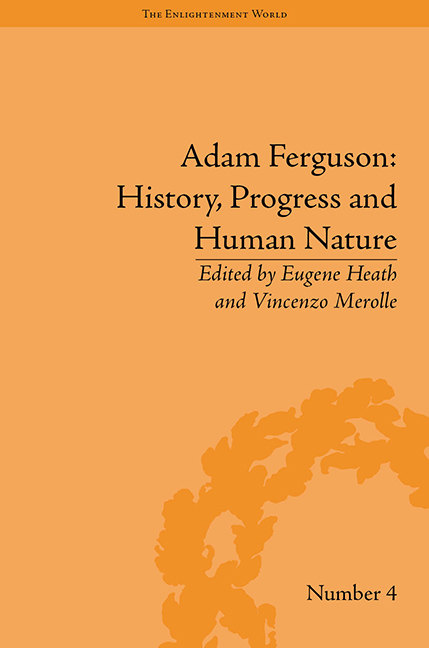Book contents
- Frontmatter
- CONTENTS
- Contributors
- Introduction
- I Life and Works
- 1 Ferguson's Epistolary Self
- 2 Ferguson and Scottish History: Past and Present in An Essay on the History of Civil Society
- 3 Ferguson's Use of the Edinburgh University Library: 1764–1806
- II In History
- III On History
- IV Human Nature, Action and Progress
- Notes
- Works Cited
- Index
3 - Ferguson's Use of the Edinburgh University Library: 1764–1806
from I - Life and Works
- Frontmatter
- CONTENTS
- Contributors
- Introduction
- I Life and Works
- 1 Ferguson's Epistolary Self
- 2 Ferguson and Scottish History: Past and Present in An Essay on the History of Civil Society
- 3 Ferguson's Use of the Edinburgh University Library: 1764–1806
- II In History
- III On History
- IV Human Nature, Action and Progress
- Notes
- Works Cited
- Index
Summary
Adam Ferguson's interests were as wide ranging as his writings. Yet the sources of his thought are not always easy to locate. By the standards of the twenty-first century, the citations in his works are quite minimal. If one is to search for the historical, literary and philosophical works that engaged his attention as he prepared his lectures, wrote his essays and composed his books, then one must move outside Ferguson's own writings. Of course, the obvious place to look is his personal library, not to mention his letters and what they reveal about that library. Unfortunately this sort of approach sheds little light on Ferguson's sources. If this subject is to receive further illumination one must proceed to consider his use of the main library available to him, the Edinburgh University Library. An inveterate user of the university library, Ferguson borrowed some 272 titles over a span of just over 40 years. It is, of course, impossible to guarantee that he read all the books he borrowed, but it is reasonable to assume that he used them in much the same way a modern scholar would.
This essay provides philosophers, historians of ideas and scholars of the book with evidence of some of the building blocks of Ferguson's thought. Such a narrated bibliography, interwoven with reminders of his life story, seems appropriate for a biographer such as myself and should provide a new vista into Ferguson's scholarly preparations, thereby enriching our knowledge of his thought. After describing the difficulty of discovering the content of Ferguson's personal library, the professor's library borrowings are recounted from 1764 (the year that a system of written receipts was set in place) until 1806, the last year in which there is any record of books being taken under Ferguson's name. The narrative of his library borrowings is placed into the context of his life, with particular attention given to how his library selections correspond with his writing. The borrowed books that are cited in his most important publications are duly remarked. As new editions of his works appear, any additional citations of borrowed books are also noted.
- Type
- Chapter
- Information
- Adam FergusonHistory, Progress and Human Nature, pp. 39 - 64Publisher: Pickering & ChattoFirst published in: 2014



